Caritas of Kraków Archdiocese
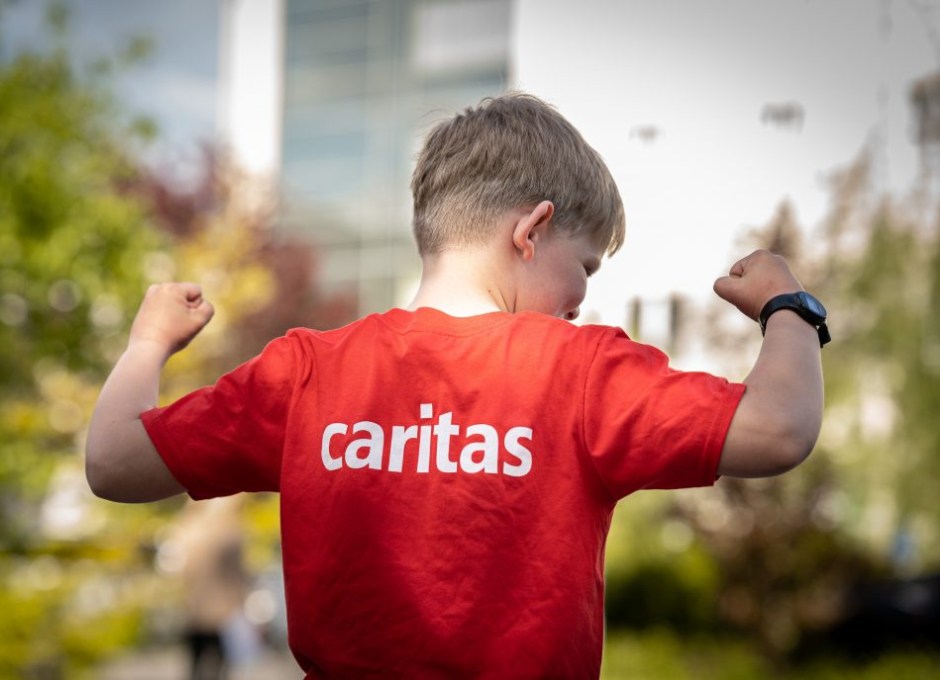
We are a Catholic charitable institution whose mission is to help the sick, the elderly and the disabled, the homeless and the unemployed. We assist families and people living in extreme poverty, children and young people from marginalised environments, as well as victims of violence, natural disasters and armed conflicts.
Caritas runs various specialised facilities to respond reasonably to those in crisis or who suffer hardship. Our website https://krakowcaritas.pl lists them all by categories of assistance:
– assistance in meeting basic needs,
– assistance to the elderly, sick, and disabled,
– assistance for people with intellectual disabilities,
– assistance for children and families,
– assistance for migrants and refugees.
Our educational facilities – schools and kindergartens – are a separate category.
We run campaigns and projects aimed at helping those in need and raising funds for these activities.
We also promote volunteering among children, young people, and adults.
We are a public benefit organisation – KRS no. 0000207658.
Following the statutory obligation of PBO, we regularly publish our performance reports and financial statements on public benefit activities.
We are one of 44 fully autonomous diocesan organisations using the same logo. In Poland, there are 41 diocesan Caritas of the Roman Catholic Church, 2 Caritas of the Greek Catholic Church, and Caritas of the Military Ordinariate of Poland. In addition to these local units, Caritas Polska has been established by the Polish Episcopal Conference to coordinate nationwide and foreign campaigns.
We operate in the Archdiocese of Kraków, but through Caritas Polska, we participate in national and foreign aid campaigns.
We belong to the Caritas community, which covers almost the entire world.
Board
Director: Fr. Tomasz Stec
Deputy Director: Fr. Łukasz Ślusarczyk
Secretary: Fr. Rafał Buzała

If you want to help us, you can:
- make a payment via our website,
- become a volunteer,
- allocate 1.5% of your income tax to us,
- make a financial donation to the Caritas account,
- give gifts in kind to the poorest,
- join the “Wings” program,
- place our banner on your website,
- tell others about our work.
Contact
Caritas of Kraków Archdiocese
ul. M. Ossowskiego 5, 30-656 Kraków
NIP: 6761119284
REGON: 040019818
We are a public benefit organisation. Our KRS no.: 0000207658
phone: +48 12 6370712, +48 12 6380708
e-mail: krakow@caritas.pl
The office is open from
08:00 AM to 3:00 PM from Mon. to Fri.
Statutory activity account of Caritas of Kraków Archdiocese:
Bank Spółdzielczy Rzemiosła w Krakowie (PLN)
Account number: 58 8589 0006 0000 0011 1197 0001
Euro: Bank Polskiej Spółdzielczości S.A.
Swift: POLU PLPR
Account number: PL 06 8589 0006 0000 0011 1197 0258
USD: Bank Polskiej Spółdzielczości S.A.
Swift: POLU PLPR
Account number: PL 28 8589 0006 0000 0011 1197 0153
Other currencies:
Bank Polskiej Spółdzielczości S.A.
SWIFT: POLU PLPR
Account number: 58 8589 0006 0000 0011 1197 0001
Public benefit activity account
Account number: 97 8589 0006 0000 0011 1197 0075
If you are willing to support the victims of the earthquake in Turkey and Syria, please make a payment to the following account:
Bank Spółdzielczy Rzemiosła w Krakowie,
Account number: 58 8589 0006 0000 0011 1197 0001
Payment title: Trzęsienie Ziemi.
If you are willing to support the refugees from Ukraine, please make a payment to the following account:
Bank Spółdzielczy Rzemiosła w Krakowie,
Account number: 58 8589 0006 0000 0011 1197 0001
Payment title: Ukraina.
Food aid is provided at the bl. Edmund Bojanowski Direct Help Centre
Brzegi 255, 32-002 Węgrzce Wielkie
History
Caritas of Kraków Archdiocese was reactivated as one of the first Caritas in Poland, established by the Metropolitan of Kraków, Fr. Card. Franciszek Macharski on January 29, 1990, 40 years after its liquidation by the communist authorities. Since its establishment, Caritas of Kraków Archdiocese has been developing, gradually expanding its scope of activity and opening up to new challenges. In 2005, Caritas already had 25 aid centres and a budget of approximately PLN 6 million.
Assistance for children and families
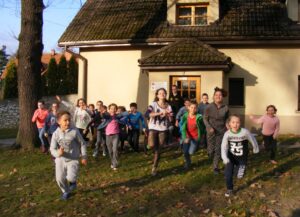
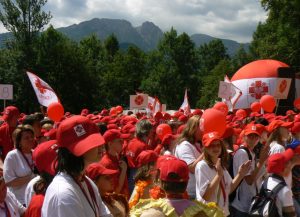
Centre for People Affected by Violence
Osiedle Krakowiaków 46, Kraków
The centre has been run since 1996 on behalf of the Municipality of Kraków. It aims at assisting adults and their children who have suffered from all kinds of violence – physical, psychological, economic, sexual, and neglected by their loved ones. People living in the facility are provided with psychological, pedagogical, social and legal assistance and professional advice. In addition, the expert advice is not limited to the centre charges: anyone from outside who would come to the facility in person or call by phone can count on our professional assistance. The Centre offers sheltered accommodation. During the low-temperature season, there are also 10 places of emergency shelter with access to sanitary facilities for women residing in the Municipality of Kraków. The facility’s activity is financed by the Municipality of Kraków and Caritas of Kraków Archdiocese.
Socialisation Centres: Kraków, Kłaj
The facilities provide round-the-clock care for children and youth deprived in part or full of parental care, who require the implementation of socialisation and treatment. The centres’ mission is to meet their charges’ necessary living and development needs. To that end, they employ various specialists: a social worker, a pedagogue, a psychologist, tutors, and an occupational therapist. The centres’ activities are financed from the funds of the Municipality of Kraków and the district of Wieliczka.
Family Centres: Kraków, Nowa Wieś
24-hour care and education facilities for eight children. They aim to create appropriate upbringing conditions similar to those in a natural family. The activities of the institutions are financed from the funds of the Municipality of Kraków and the district of Myślenice.
Day-support Centres for Children: Tenczynek, Kraków, Wieliczka
The facilities aim to provide care, education and tutoring to their charges, organise their free time through various activities and games, and ensure they have a hot meal daily. The participants of the classes are children from families in crisis – poor, multi-child or dysfunctional families, as well as children with behavioural problems. The employees of the centres constantly work with their charges’ families. The most impoverished children also receive material help (shoes, textbooks, school supplies). Over the years, various interest groups have developed, such as sports, creative workshops, a reading corner, a fashion club, and cooking classes. By participating in the above activities and thus dedicating our time to the children in our care, we can better see their abilities and talents. Rewards and praise reinforce children’s positive qualities, facilitating their social functioning. Guardians motivate pupils to study, self-educate, and fight boredom and aggressive behaviour. The facilities were financed by the communes of Krzeszowice and Wieliczka, the Municipality of Kraków, the district of Wieliczka, and Caritas of Kraków Archdiocese.
Leisure time activities for children and youth
An essential part of Caritas’ activities is organising summer and winter holidays for children and youth from low-income families. Thanks to our annual nationwide charity event, “Wigilijne Dzieło Pomocy Dzieciom” (Christmas Aid for Children) and subsidies from public funds, we can organise summer camps for children from low-income families. Their parents only bear a partial cost of their children’s stay at the summer camp, the reduction depending on the family’s income. This annual event allows us to provide active leisure for children who, without the help of Caritas, would have stayed at home for the entire holidays.
Help for the poorest and homeless
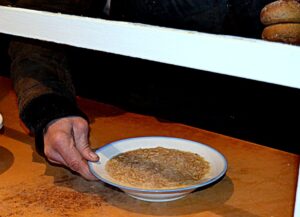
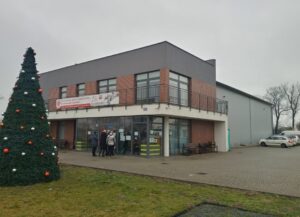
Direct Help Centre in Brzegi
In this ranking, Caritas of Kraków Archdiocese is the best among Polish Caritas. Our Direct Help Centre distributed food financed by the European Union under the Food Aid Operational Program, co-financed by the Fund for European Aid to the Most Deprived for over 40,000 people. To that end, we cooperated with over a hundred local partners: parishes and welfare centres. The Direct Help Centre in Brzegi also organised workshops on meal preparation, healthy eating, efficient household budget management, and food waste prevention for the program participants. The centre’s activities were financed by Caritas of Kraków Archdiocese, the Municipality of Kraków and Caritas Polska.
St. Brother Albert Soup Kitchen, ul. Dietla 48, Kraków
Caritas Soup Kitchen is the largest facility of this type in Kraków. Approximately 600 (in summer) to 800 (in winter) meals are served daily. The beneficiaries are large families, single mothers, retirees, pensioners, and elderly, single, homeless, unemployed or released from prisons. The activity of the Kitchen is critical in autumn and winter, when providing homeless people with hot soup often allows them to survive a difficult period. The activities of the Kitchen are financed by Caritas of Kraków Archdiocese, the Archbrotherhood of Mercy, the Municipality of Kraków, the Lesser Poland Provincial Office and individual donors.
Help for the sick and elderly
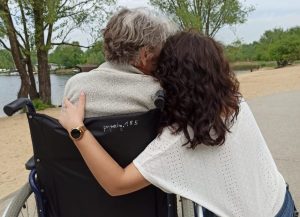
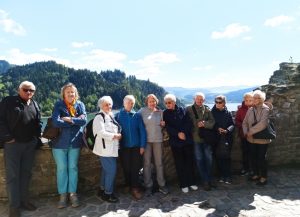
Caritas Care Stations
Caritas of Kraków Archdiocese runs 7 Care Stations: in Zakopane, Wieliczka, Gdów, Myślenice, Nowy Targ (nursing and rehabilitation care from Monday to Friday), Zembrzyce, and Zator (rehabilitation only). The facilities provide free, professional nursing and rehabilitation services to chronically ill people, especially those in a difficult financial situation. Services are provided in patients’ homes, at the station’s premises, and, if possible, in rehabilitation equipment rentals. Care Stations are fully furnished with the equipment necessary for rehabilitation.
- Care Station in Zakopane: home care for 50 permanent patients. Rehabilitation at the centre + home rehabilitation: approx. 27,000 treatments annually
- Care Station in Wieliczka: 65 patients in home care. Rehabilitation at the centre + home rehabilitation: approx. 25,000 treatments annually
- Care Station in Gdów: 41 permanent patients in home care. Rehabilitation treatments: almost 60,000 per year for nearly 1,500 patients. Rehabilitation Centre in Gdów: 1,300 people.
- Care Station in Myślenice: 46 permanent patients in home care. Rehabilitation Centre in Myślenice: 47,000 procedures, 750 patients a year.
- Care Station in Nowy Targ: 80 permanent patients in home care. Rehabilitation Centre in Nowy Targ: 3,000 patients, over 81,000 treatments annually.
- Care Station in Zembrzyce: only rehabilitation treatments. Over 9,000 treatments for about 200 patients.
- Care Station in Zator: 17,000 treatments, almost 600 patients. The Rehabilitation Clinic in Zator serves nearly 400 patients.
Care stations, in most cases, function thanks to the cooperation between Caritas of Kraków Archdiocese, the parish, and local government administration.
Chronic Medical Care Home
Caritas Chronic Medical Care Home run by Caritas Kraków provide rehabilitation and care services for adults suffering from rheumatic, orthopaedic, and traumatic diseases, nervous system disorders and other conditions requiring general rehabilitation. The centre offer round-the-clock nursing care and follow-up pharmacological and dietary treatment and rehabilitation (kinesiotherapy, physical therapy, hydrotherapy, or therapeutic massage). The facilities are fully equipped with rehabilitation and medical apparatus, and our rehabilitation services are very advanced.
- In Hanna Chrzanowska Caritas Chronic Medical Care Home in Zator, there are approximately 100 patients.
Funds for the services provided come from the National Health Fund. In addition, Caritas of Kraków Archdiocese covers the renovation and maintenance costs of buildings and equipment.
Holiday and Rehabilitation Centres
Holiday and Rehabilitation Centres for the Sick in Zebrzydowice and Zembrzyce were created for people who, due to illness, disability or old age, cannot go to regular holiday resorts. The facilities are open all year round. Rehabilitation treatments make it possible to improve the physical fitness of older people and, in the case of more severe conditions, help maintain physical fitness at a constant level.
- In the Our Lady of the Rosary Holiday and Rehabilitation Centre in Zebrzydowice, the refugees from Ukraine are staying there.
- In the St. Brother Albert Holiday and Rehabilitation Centre in Zembrzyce, about 700 people participate in rehabilitation stays every year, of which over 500 stays for a more extended period.
Social Assistance Houses
Social Assistance House of Caritas of Kraków Archdiocese in Biskupice is a permanent residential facility for 75 people. It offers 60 places for the elderly and 15 for the chronically somatically ill. The House’s objective is to provide its residents with safe and dignified living conditions, intimacy, independence adapted to their fitness level, and maintain their self-reliance. The task is carried out jointly with the commune of Biskupice and other communes. The House residents co-finance their stay in a similar way as in traditional social assistance houses.
Social Assistance House of Caritas of Kraków Archdiocese in Raba Wyżna is a permanent residential facility for 36 people. It offers 10 places for the elderly and 26 for the chronically somatically ill. The House’s objective is to provide its residents with safe and dignified living conditions, intimacy, independence adapted to their fitness level, and maintain their self-reliance.
Day-care assistance houses for the elderly
Caritas also runs day-care assistance houses for elderly and lonely people in Kraków and Brzegi (near Wieliczka).
- Support Centre for the Elderly: Self-Help Club in Kraków, ul. Komandosów 18
- Support Centre for the Elderly and Disabled in Brzegi near Wieliczka
Participants of the classes are retirees or pensioners over 60 years of age. The mission of the Houses is to strengthen the activity of the elderly and lonely and their integration with the local environment. We also aim to provide them with free time activities, supporting their ability to cope with difficult everyday situations, improving their psychophysical condition and encouraging them to care for their health. The Centres conduct various activities focused on broadly defined therapy and activation of older people and organise outings (for example, to the cinema) and trips aimed at seniors’ cultural and social development. In addition, the following events are scheduled: celebrations and occasional meetings, artistic handicraft classes, manual classes, and therapeutic cooking. In addition, we teach our charges how to use the Internet and operate electronic devices: printers, digital cameras, cameras, and mobile phones. Thanks to our rehabilitation classes, the elderly can improve their physical and mental condition.
The Support Centre for the Elderly – Self-Help Club in Kraków is financed by the Municipality of Kraków and Caritas of Kraków Archdiocese.
The Centre for the Elderly and Disabled in Brzegi are financed from the funds of the commune of Wieliczka and Caritas of Kraków Archdiocese.
Community Self-Help Centre for People with Alzheimer’s Disease in Kraków
The facility is a day centre for over 30 people. Its main goal is to help people who suffer from Alzheimer’s disease and other dementia disorders by maintaining their intellectual and physical fitness for as long as possible. These goals are achieved through individual therapy and psychotherapy as well as occupational therapy workshops on art and technology, cooking and household activities. The Centre also organises for its patients some physical activities (gymnastics), cultural and educational classes, music therapy and training to maintain cognitive and social functions (reminiscence, validation, and cognitive stimulation therapies). As part of the stay, assistance and nursing care are also offered. During classes at the facility, everyone undergoes personal hygiene training (all necessary products provided) to maintain their independence in everyday life for as long as possible. Physical activities are also carried out under the supervision of nurses.
In addition, the Centre runs a support group for families and carers of people attending the facility to assist them in taking care of their close ones and help them understand the specificity of their diseases. During their stay at the facility, our patients are provided with hot meals, which they can enjoy in a safe and restful environment. The functioning of the Community Self-Help Centre for People with Alzheimer’s Disease is financed by the Municipality of Kraków.
Protected Apartments for the Elderly and Disabled in Brzegi
The facility was launched on December 2, 2016, to provide sheltered housing for 15 elderly and disabled people. The residents function independently with ad hoc support from specialists, including a social worker and a psychologist.
Assistance for people with intellectual disabilities
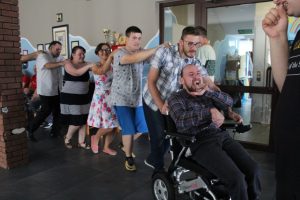
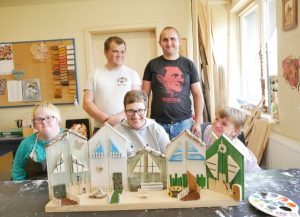
Community Self-Help Centres
Community Self-Help Centres are day centres for people with intellectual disabilities, mental disorders, and mobility impairment. The main objective of facilities of this kind is to support disabled people in their development (physical, intellectual, emotional, and social) in the most optimal way. Therapeutic activities in the facilities are tailored to the needs and psychophysical skills of the participants. Supportive and rehabilitation procedures include training in self-help skills, life resourcefulness and functioning in everyday life (hygiene training), social and interpersonal skills, and training in spending free time.
An essential component of the everyday life of people with disabilities is broadly understood integration with society. Therefore, our centres ensure that in addition to primary treatment, our charges can also take part in various other classes, such as cooking, multimedia, art and tailoring. They can also participate in cultural events such as exhibitions and photographic or painting competitions. In one of our centres, there is a pantomime theatre group which allows our charges to express their emotions on stage by playing various roles. In addition, we remember the necessary physical activity and organise walks and outings to the swimming pool, climbing wall, or sports competitions.
- Social Assistance House (ŚDS in Polish) in Kraków, ul. Pasteura 1
- Social Assistance House in Kraków, ul. Komandosów 18
- Social Assistance House in Wola Filipowska, ul. ks. M. Mądrzyka 32
The facilities are financed by the Municipality of Kraków, the Municipality of Krzeszowice and Caritas of Kraków Archdiocese.
Foundation for People with Disabilities
Stróże 413, 33-331 Stróże
e-mail: info@fpon.org
tel. 18 5351 770
Account number: BSK I o/Nowy Sącz 43 1050 1722 1000 0012 0317 9021
The Foundation for People with Disabilities (FPON) was established in 1998, and in 2001 it was merged with the Foundation for the Support of the Mobility Rehabilitation Centre in Stróże. In 2023, Caritas of Kraków Archdiocese became a member of the Board of Founders. The Foundation has the status of a public benefit organisation. The following projects are carried out and implemented under the FPON:
- Padre Pio Training and Rehabilitation Centre
The offer of the Centre includes: medical rehabilitation stays financed by the Social Insurance Institution (ZUS) within the framework of disability prevention (about 100 people), inpatient rehabilitation in the ward, outpatient rehabilitation in the medical rehabilitation centre (70 children), and holidays combined with medical rehabilitation.
- Occupational Therapy Workshops
The aim of the workshops is social and professional rehabilitation of people with disabilities. At present, the classes are attended by 42 participants grouped in 8 laboratories.
- Integrated Kindergarten
The main objective of the facility is to provide preschool education integrating 15 children with disabilities with their 77 non-disabled peers.
- Christ the King Hospice
The Foundation provides palliative care as part of a stationary hospice (31 patients), a home hospice for adults (12 patients) and a home hospice for children (20 patients).
- Department of Systemic Rehabilitation
The facility offers 37 places for patients who undergo comprehensive rehabilitation in hospital conditions.
- Our Lady of Fatima Vocational Development Centre (ZDZ https://www.pfron.org.pl/en/institutions/placowki/vocational-development-centers/)
The facility provides comprehensive socio-occupational rehabilitation by employing 60 people with disabilities in 6 laboratories.
- Hippotherapy and Canine-Assisted Therapy Centre
The Centre offers several forms of rehabilitation, such as horse riding lessons, hippotherapy, and canine-assisted therapy.
The activity of FPON is financed by: Caritas of Kraków Archdiocese, the National Health Fund, the Social Insurance Institution, the State Fund for Rehabilitation of Disabled People (PFRON), Lesser Poland Voivodeship, and the district of Nowy Sącz.
Occupational Therapy Workshops
Occupational Therapy Workshops (WTZ) are daytime centres. They carry out social and vocational rehabilitation tasks aimed at general development and improvement of fitness, which is necessary for a disabled person to live an independent and active life to the best of their abilities. The objective of the classes is to develop skills needed in everyday life as well as professional and psychophysical skills required at work. The facility covers the expenses related to transport, rehabilitation of the charges and their participation in occupational therapy (gardening, tailoring, sculpture, household activities, art, music with origami elements, carpentry, multimedia and various crafts). The charges also take part in many events for people with disabilities and, as a part of their therapy, work on various objects for which they receive pocket money. This is a crucial element of the treatment since it emphasises the dignity of people with disabilities and increases their importance in families.
- WTZ in Odrowąż: 40 people,
- WTZ in Zembrzyce: 40 people,
- WTZ in Spytkowice: 55 people.
The activities of the Occupational Therapy Workshops are financed by PFRON by the agency of counties and by Caritas of Kraków Archdiocese.
Social Assistance House in Zator
The Social Assistance House in Zator, run by Caritas of Kraków Archdiocese, is a permanent residence centre for people with intellectual disabilities. Residents are provided with round-the-clock care; they can receive occupational therapy and rehabilitation in the centre. Due to various degrees of intellectual disability, the charges are divided into groups where therapeutic classes are conducted separately. In order to meet all the psychophysical needs of the residents, each of them has a selected first-contact caregiver who supports them in all everyday problems. For each resident, the therapeutic and care team prepares a plan of individual supervision concerning the resident’s functioning and the type and scope of individual and group activities. On average, more than 50 people with intellectual disabilities of varying degrees live in the House. People are admitted to the Social Assistance House in Zator on the same terms as state nursing homes.
Educational activity
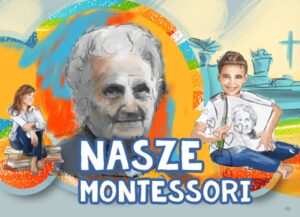
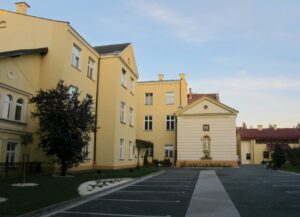
Primary School education
The educational institutions of Caritas of Kraków Archdiocese aim to educate students in conformity with the rules of Christian personalism, responsibility for oneself and others, and the common good in family and social life. Therefore, the Catholic Educational Centre has been established. The school supports students’ comprehensive and harmonious development by teaching, upbringing, counteracting threats, and care. The school’s mission is also to support parents in raising their children. Desiring to teach and educate active and responsible citizens endowed with the „imagination of mercy”, the school implements the „Education for Values” program.
St. Family of Nazareth Catholic Schools in Kraków, ul. Pędzichów 13
- St. Family of Nazareth Catholic Primary School: about 400 students.
- St. Family of Nazareth Catholic Secondary School: less than 200 students.
St. Rita Catholic Primary School in Kraków, ul. Wincentego Pola 4
Montessori school (grades 1-3): over 40 students
St. Jadwiga of Poland Catholic Primary School in Kraków, ul. Łokietka 60
About 240 students
St. Gianna Beretta Molla Catholic Primary School in Kraków, ul. Stelmachów 137
288 students
Pre-school education
Children work with the Maria Montessori method, which is based on learning in mixed-age groups and on the organisation of working time around a long block of the so-called „own work”. The child can choose the subject of his work and decide how long he will deal with a given topic. He can also use special Montessori teaching aids constructed according to specific rules. Children work individually or in small groups, respecting two basic rules: order and silence. The teacher observes the children and treats each one individually, supervising the learning process, proposing to deepen the subject or to change for a new one depending on the child’s current involvement in the work.
Maria Montessori Kindergarten in Wieliczka, ul. br. A. Kosiby 18
49 children
Maria Montessori Kindergarten in Michałowice, Raciborowice 2
The facility implements a primary preschool curriculum enriched with the Montessori method. 60 children
St. Rita Catholic Primary School in Kraków, ul. Wincentego Pola 4
Preschool classes
The facility educates children according to the Montessori method.
21 children
In total, over 1500 students have already attended schools and kindergartens under the supervision of Caritas.
Annual Campaigns by Caritas of Kraków Archdiocese
Christmas Aid for Children
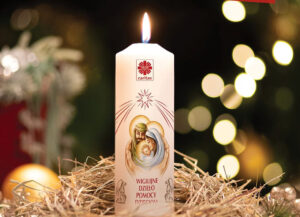
The oldest and most famous nationwide Caritas campaign. At the beginning of Advent, Caritas Christmas candles, traditionally present on Polish Christmas Eve tables, appear in all parishes of the Archdiocese of Kraków. Each small donation for a candle expresses solidarity with the youngest victims of poverty since collected money is used by parishes and Caritas of Kraków Archdiocese to help the poorest children. Also, a small part of each donation (10 groszy) is allocated to help foreign children.
Caritas of Kraków Archdiocese usually distributes the most significant number of candles in all diocesan Caritas – about 170,000. Donations made to parishes are most often used to pay for school lunches and Christmas packages or to help the poorest families. In addition, Caritas Kraków usually allocates the collected money to organise a winter camp and holidays for children, to buy school lunches for children whose parents cannot afford them, and to subsidise the Caritas own facilities, such as the Mother and Child Home.
Lenten Alms
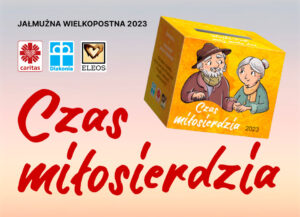
During Lent, Caritas conducts the Lenten Alms action to raise funds to help those in need and shape appropriate charitable attitudes. Around 24,000 cardboard piggy banks are distributed to children and youth in our archdiocese. Caritas also sends catechesis plans to interested parishes. The action is educational: it teaches love of neighbour, which costs money. By giving up small but specific pleasures (sweets, various forms of entertainment), you can save money and spend it on a good cause. Through a small sacrifice, we can help those in a difficult life situation. Donations collected by children stay in parishes. They are intended to help the poorest, the sick, the elderly and the lonely.
Caritas Easter Action
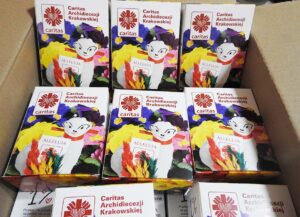
Caritas distributes around 50,000 Easter lamb cakes for the Easter table to the parishes of the Archdiocese of Kraków. The donations are intended to help the sick, the elderly and the disabled. The money collected during previous Easter actions has already helped, among others, in the renovation and extension of the Caritas Centre in Zembrzyce, in the construction of the Family Help Centre in Kraków and the Occupational Therapy Workshop in Spytkowice near Zator, in the extension of the Caritas Care Station in Gdów, as well as in the maintenance of the Holiday and Rehabilitation House in Zebrzydowice, intended for temporary stays of the elderly, sick and disabled.
Let happiness bloom!
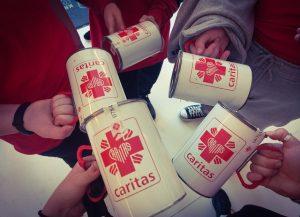
Action directed at newlyweds. We encourage them to suggest to their guests that instead of bringing flowers to their wedding, they make a donation to help those in need. After reporting this fact to Caritas of Kraków Archdiocese, the bride and groom will receive a collection box and a thank you note, which the priest blessing the wedding will read at the end of the ceremony. After the wedding, the guests can contribute money to this special box which the newlyweds will hand over to Caritas of Kraków Archdiocese.
Nationwide food collection

Twice a year, before Easter and Christmas, Caritas organises a collection of food for the poorest. It helps parishes organise and settle collections by providing posters, t-shirts, badges, leaflets, thank you cards for shops, and report templates. The food collected by the parish is distributed among the neediest parishioners. About 1,000 volunteers from Caritas Parish Teams and Caritas School Clubs participate in the Food Collection in the Archdiocese of Kraków by collecting food in over 100 stores. As a result, more than 20 tons of food are usually delivered to those in need.
1.5% Tax Allocation
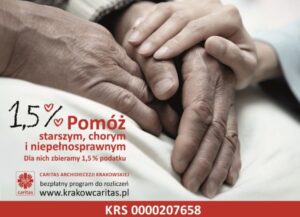
From January to April, there is an information campaign on allocating 1.5% of personal income tax to Caritas – a public benefit organisation in Kraków. Thanks to this 1.5% tax allocation, we can support the elderly, the sick and the disabled by helping them in treatment and rehabilitation and by creating or renovating facilities that offer these services.
Wings
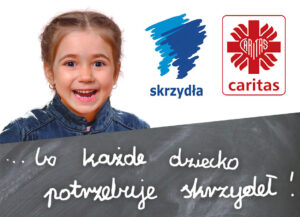
“Wings” is a program of long-term assistance for primary school and high school students who, due to the poor financial situation of their families, require support in the form of meals at school, purchase of school supplies and textbooks, clothing adapted to the season, co-financing for school trips, etc. Under the program, the Donor’s „wings” help a specific child. They know his name and his general family situation, interests and problems. Each month donors pay the declared amount (usually about PLN 150), which is then transferred to the child’s parents. Caritas requires parents to settle the received money with invoices, which guarantees good use of the funds. During the school year, Caritas of Kraków Archdiocese helps about a hundred children in this way.
Caritas Holiday Campaign
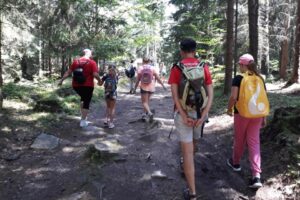
The Caritas Holiday Campaign is one of the most significant initiatives and one of the oldest carried out by Caritas in Poland. As part of this campaign, Caritas of Kraków Archdiocese organises summer camps for about 650 children and youth from the poorest families in the Archdiocese. Caritas Kraków also organises winter holidays for children. Thanks to this program, children from families who cannot afford a fully paid holiday can go to the seaside or the mountains. Our camp participants get to know their country while having fun and learning many skills they could not acquire by staying in their cities or the countryside.
Divine Mercy Week
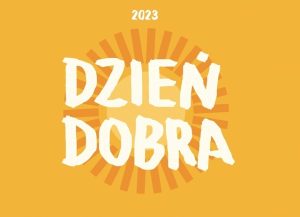
Divine Mercy Sunday begins Divine Mercy Week, whose aim is to sensitise people to the needs of the sick, the elderly, the disabled, the poor and those who need help for various other reasons. Every year the theme of this week changes, and Caritas provides parishes with all the necessary materials. At the end of the Divine Mercy Week Caritas organises the Good Day – the event of the workers and volunteers of Caritas of Kraków Archdiocese.
Help for victims of natural disasters and wars
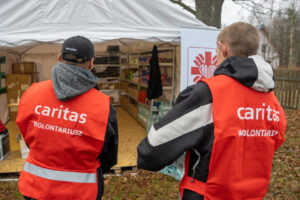
Caritas is involved in nationwide actions to help victims of natural disasters, both in Poland and abroad, and war victims. In recent years, we have supported people affected by floods in our country and overseas, victims of the tsunami in Asia and the earthquake in Haiti, victims of natural disasters in El Salvador, India, Mozambique, Turkey, Siberia, Iran, starving children in Africa, refugees from Syria, families suffering from conflict in Ukraine. The largest aid program run by Caritas Polska is the „Family to Family” campaign to help victims of the war in Syria.
Promotion of volunteering
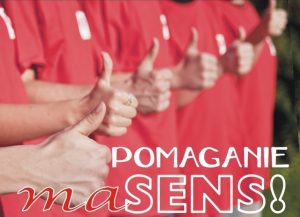
The extensive activities of Caritas Kraków would not be possible without the support of volunteers, both young people in the Caritas Volunteer Centre of the Archdiocese of Kraków, as well as people involved in charity service in parishes and schools in our archdiocese (Parish Caritas Teams, Parish Charity Teams, School Caritas Clubs). Promoting volunteering is an important element of conscious planning of a professional and effective strategy for helping another human being.
Caritas School Clubs
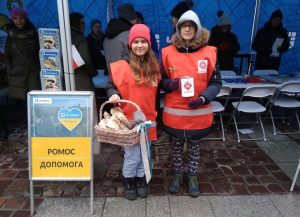
Their goal is to mobilise young people to act to benefit those in need. Volunteering teaches helping others and social responsibility, which is a critical aspect of the personality development of a young person. Currently, there are about 100 Caritas School Clubs in the Archdiocese of Kraków.
Caritas Parish Teams
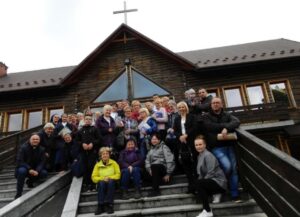
They bring together about 500 volunteers who help the sick, the elderly and the needy in their parishes in various ways. Parish volunteering is mainly popular among pensioners, thus playing a significant role in activating seniors.
Volunteers in Caritas facilities
They are involved in helping in the current functioning of facilities run by Caritas, depending on their nature.
Volunteer Centre
It brings together volunteers who are directly involved in actions carried out by Caritas of Kraków Archdiocese (assemblies, food collections, holiday campaigns). In addition, Caritas organises trainings, retreats and the annual National Caritas Pilgrimage for volunteers.
Rehabilitation Equipment Rental, ul. Komandosów 18, 30-334 Kraków
mobile: +48 729 978 773,
e-mail: wypozyczalnia@med-darserca.pl; https://med-darserca.pl/
The rental offers rehabilitation beds, oxygen concentrators, secretion aspirators, wheelchairs, walkers, wheelchairs and toilet seats. The whole collected money is spent on charity activities.
John Paul II Holiday and Retreat Centre in Zakrzów near Kalwaria Zabrzydowska
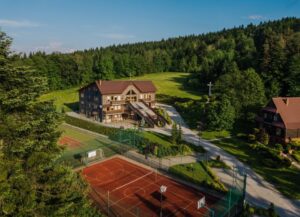
Leisure complex named after St. John Paul II is located on the slope of Chełm Mountain (603 m a.s.l.). The resort consists of 6 buildings. In the upper part of the retreat centre, there are four stylish larch villas with 20 two-room segments with bathrooms, intended for families or organised groups (102 places in total) and a cafe that can accommodate about 30 people. The adjacent Conference Centre comprises three conference rooms, a well-equipped gymnasium and a chapel with a papal altar used in Błonia Krakowskie during the last pilgrimage of St. John Paul II to his homeland. In the same building, you can find the mini-SPA (gym, sauna and jacuzzi). A ski lift was built in the clearing behind the Conference Centre, while next to the building, two multifunctional artificial turf pitches were built for team games: a pitch with synthetic grass for football, handball and tennis and a polyurethane court for basketball and volleyball. Free wireless Internet access is provided in the resort. In the lower part of the complex, there is a large building for children and teenagers with 12 rooms for several people with bathrooms. It can accommodate a group of up to 60 people. On the ground floor of the building, there is a kitchen and a dining room. At a distance of approx. 100 m, there is a full-size grass pitch and a clearing with a place to play by the fire in the forest next to the building.
Zakrzów and its surroundings, abundant in unusual landscapes, clean air and silence, are perfect for individual and group recreation. In the forests surrounding the resort, you can see rare, protected species of plants and animals; in autumn, you can find here plenty of mushrooms.
The whole collected money is spent on charity activities.
Centre address: Ośrodek Wczasowo-Rekolekcyjny im. Jana Pawła II, Zakrzów 76, 34-145 Stronie
phone +48 33 873 92 15,
office/reception: +48 781 423 076,
zakrzow.caritas.pl, e-mail: zakrzow@caritas.pl
GPS position: +49° 48′ 51″, +19° 39′ 7″
CARITAS OF KRAKÓW ARCHDIOCESE SUPPORTS THE VICTIMS OF THE WAR IN UKRAINE
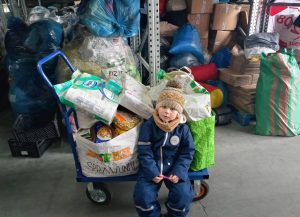
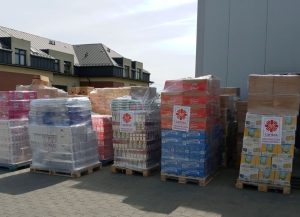
From the first day of the armed conflict (February 24, 2022) that Russia started against the Ukrainian nation, Caritas of Kraków Archdiocese has been helping refugees arriving in our country and victims of armed conflict in Ukraine.
The main objectives of Caritas’ assistance for refugees are accommodation, food and material aid, and humanitarian transport to Ukraine.
Accommodation
Daily shifts at the Caritas office began on Friday, February 25. Sometimes they ended late at night. We started to organise a base of accommodation and volunteering.
Due to Caritas, many refugees, mainly mothers and children, have found free short- or long-term shelter. These people found refuge primarily in Caritas facilities located in Kraków, Zembrzyce (6 disabled people and their elderly caregivers were located in St. Brother Albert House), Zebrzydowice, Biskupice and Zakrzów near Kalwaria, as well as in convent and retreat houses, parishes, and private homes. Many accommodated people set for further travel to reunite with their families, acquaintances or friends in other countries.
On March 12 and 13, 2022, we transported 110 orphans with their guardians from Stalowa Wola to Leśnica-Groń and Bukowina Tatrzańska. After a few days, they were relocated – some started their further travel, and some were accommodated in Bukowina Tatrzańska, where they are now.
Emergency aid stations – food, clothing, personal hygiene products
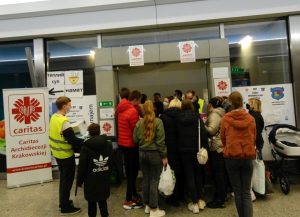
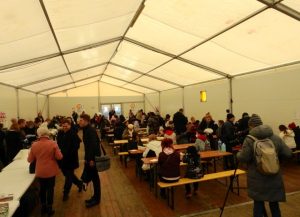
At the Main Railway Station in Kraków, Caritas has launched an all-day emergency aid station, which operates with the great support of volunteers. Material aid is issued there, mainly food (packed lunches), hygiene articles, blankets, sleeping bags, dressings, painkillers and everything that donors bring. The main purpose of the point is ad hoc, immediate help. The station also provides the refugees with the following information: where to stay, where to have a hot meal, where to register their stay, and where to receive material assistance necessary for their further stay in Poland.
Caritas of Kraków Archdiocese is also responsible for the tent where hot meals for refugees are served. The tent was set up at Jan Nowak Jeziorański Square at the Kraków railway station with the support of the Lesser Poland Voivodeship. The tent is open 24/7, and in it, with the help of the communities of our diocese, other organisations, individuals and a vast number of volunteers, we serve around 6,000 hot meals, packed lunches and drinks.
The St. Brother Albert Soup Kitchen at Dietla Street in Kraków also provides free food to refugees.
The Caritas office in Kraków is on duty daily, providing information, directing to accommodation, and offering material assistance. To that end, a job position was created for a person fluent in Ukrainian, Russian and Polish, and a coordinator from the Caritas office was delegated.
Humanitarian aid transports
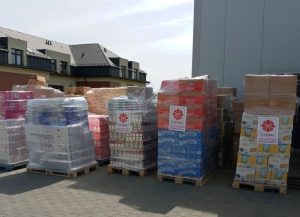
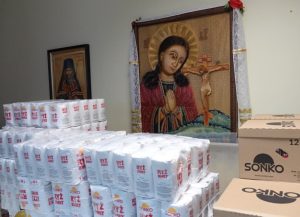
So far, thanks to the incredible support of people of goodwill, we have managed to send to Ukraine (Kyiv, Kharkiv, Lviv, Ternopil, Rivne, Zhiravnec, and Uzhgorod) about 30 trucks and several dozen delivery trucks with humanitarian aid with a total weight of about 800 tons, mainly filled with food, blankets, hygiene products, cleaning products, sleeping bags, bandages and other dressings.
The help we constantly give to refugees from Ukraine is possible thanks to the enormous commitment of all employees of Caritas of Kraków Archdiocese, a large number of volunteers, and a group of Kraków guides.
We are still ready and helping those who most often have lost everything and need our support.
Migrants and Refugees Help Centre (CPMiU) of Caritas of Kraków Archdiocese
The Migrants and Refugees Help Centre at Caritas Archdiocese in Kraków was launched in September 2022. In July 2022, we enabled refugees to participate in Polish language courses and integration classes (gymnastics, handicraft workshops, art workshops and many others). These activities and workshops were conducted by volunteers.
Currently, the Centre has over 4,000 beneficiaries registered. Until March 2023, each of them received a food package every month.
Since September 2022, work with beneficiaries has focused on integrating with Polish society, mainly through integration trips for adults and children.
95 people completed the Polish language course.
Several occasional events were organised during this period: preparing fully-equipped backpacks for children for 1st September, preparing gifts for Saint Nicholas’ Day and Children’s Day, and managing family festivities.
In addition, CPMiU provides the following:
- vocational training,
- training in the legalisation of stay,
- Polish language workshops,
- handicraft workshops,
- manual workshops,
- medical first aid training,
- participation in family picnics,
- protection for children.
Currently, CPMiU is supported by over 30 volunteers who help pack food parcels, prepare Christmas decorations, distribute Christmas and Easter packages to Polish families, and help organise the Good Day.
An important and continuous activity of the Centre is the dispatch of humanitarian transports to the most affected areas of Ukraine. This support was strengthened by the „Parcels for Ukraine” campaign, which allowed over 1,000 cartons full of food to be shipped to the bombed-out places in this country.


